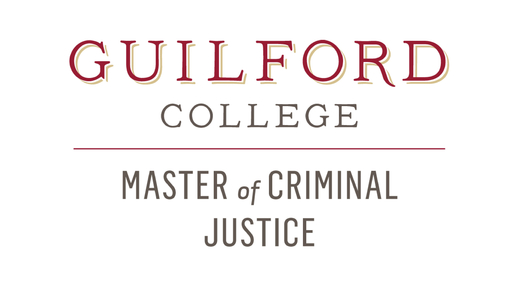Master of Criminal Justice
M.S., Graduate
Why Guilford? Meet some of the graduates of the master's program and find out what they're doing now.
Give Your Career a Boost with Guilford's Master of Criminal Justice
All sworn and non-sworn Criminal Justice workers receive a 10 percent discount on tuition.
The master’s in Criminal Justice focuses on connecting criminal-justice theory to practice. You’ll analyze current practices in the field and offer critical reflection to enhance your ability to address problems as they occur in real time.
MCJ Program Grows: Read more about the future of the MCJ program.
The program will prepare you to make a more meaningful contribution to public safety and security and to the wellbeing of your community. It also:
- Provides graduate level, in-depth study of criminal justice in preparation for a career or career enhancement
- Offers interdisciplinary perspectives relevant to the advanced study of criminal justice
- Offers a distinctive curriculum that’s theoretically grounded, empirically rigorous, and policy-oriented (I.e., it draws upon the evidence-based and problem-solving traditions of the field to address complex questions of crime causation, control, and prevention.)
- Emphasizes advanced critical thinking, written and verbal communication, and research into contemporary issues, such as police discretion, use of force, racial profiling, mandatory minimum sentencing, and the death penalty
Distinctive Features
- Only Criminal Justice master’s program in the Triad
- Convenient evening classes
- Finish the program in three semesters.
- Faculty members have practical experience in law enforcement, courts, and corrections.
- All sworn and on-sworn criminal-justice workers receive a 10 percent discount on tuition.
Classes With Opportunity for Hands-on Learning
- Foundations of Criminal Justice
- Problem Solving in Criminal Justice
- Crime, Justice, and Community
- Advanced Research Methods or Advanced Data Analysis
- Thesis
Program Costs
Tuition is $600 per credit for the 40-credit, 18-month program. Note that all sworn and non-sworn criminal justice workers receive a 10 percent discount on tuition. If accepted, a $250 deposit, which will be applied to your first tuition bill, is required to hold your spot. For more information, visit the Graduate School Financial Aid webpage.
Degree Requirements
To earn Guilford's Master of Criminal Justice, students must complete 10 courses (40 credit hours). There are six required courses that all students must take and four electives in such areas as police, courts and law, corrections, and crime and policy.
Accelerated B.S. to M.S. Program (Guilford College Students Only)
The accelerated B.S. to M.S. program allows Guilford students to begin their graduate work as undergraduates. In this model, full-time Guilford undergraduate students apply for the graduate program in their junior year. If accepted, they take one graduate course in the fall of their senior year and two graduate courses in the spring of their senior year. These graduate courses replace the two upper-level electives in the Criminal Justice major and the one lower level elective in the Criminal Justice major.
Undergraduates who are not Criminal Justice majors may be accepted into the program, but the decision to allow graduate courses to count for major requirements is at the discretion of the department the student is majoring in. If a department does not allow graduate courses to count for major requirements, the graduate courses would count as general elective credits toward their undergraduate degree.
Admission into the accelerated program requires:
- A minimum cumulative G.P.A. of 3.0
- A completed graduate program application in the student’s junior year
- Acceptance into the program by the Graduate Program Director
An undergraduate student will not be allowed to take graduate courses until they have completed JPS 300 (Professionalism and Ethics in CJ), JPS 333 (Criminology), and JPS 337 (Research Methods).
Graduate courses taken as an undergraduate student will double count toward both their bachelor’s degree and their master’s degree. Only full-time undergraduate students are eligible to be admitted into the accelerated B.S to M.S. program.
College Catalog
For more information about courses for the Master of Criminal Justice and the Justice and Policy Studies Department, visit the Graduate School page in the College Catalog.


